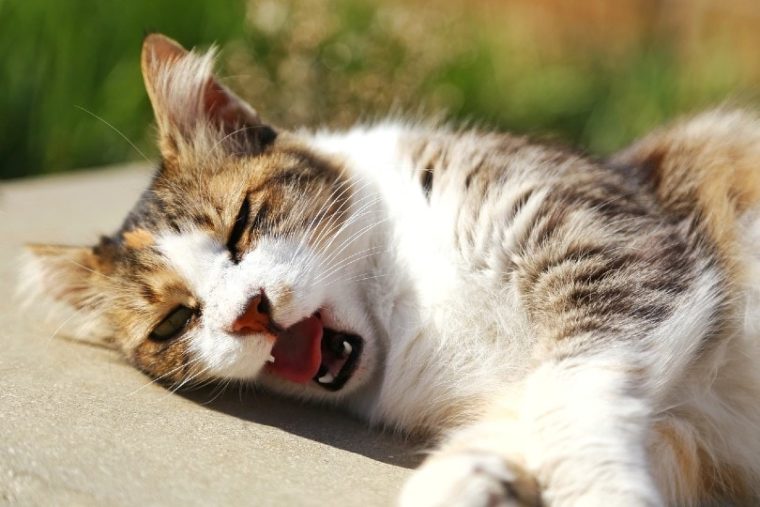
Coughing is atypical for cats, as they cough much less than other animals. That said, many cat parents often confuse gagging, retching, or coughing up hairballs with regular coughing.
If your cat only coughs every now and then, there shouldn’t be any reason to worry or investigate the behavior. However, if your cat is frequently coughing, there might be an underlying medical issue, such as respiratory infection or asthma. Your cat may also cough after inhaling dust or smoke.
In this article, we talk more about cats and coughing, mentioning the reasons that your cat is coughing and their treatment options, when your cat’s cough should concern you, and how to prevent coughing in your cat.
Let’s dive in!
The 7 Reasons for Coughing in Cats
1. Respiratory Infections
One of the most common reasons for feline cough is respiratory infection caused by viruses and bacteria. Although various organisms play a part in the development of feline respiratory infections, two viruses are typically the cause of the infection: feline calicivirus and feline herpes virus. Your cat could also experience respiratory infections due to other organisms, such as chlamydophila, feline bordetella, cryptococcus, and mycoplasma.
Besides coughing, other signs of respiratory infections in cats may include:
Most respiratory viruses in cats don’t require urgent medical attention. However, it’s good to monitor your feline and discuss their condition with your vet.
Treatment Options:
Most feline respiratory infections are treated with drugs like antibiotics, probiotics, and amino acid supplements. Some veterinarians also recommend steam therapy, though severe infections may require hospitalization for your feline.
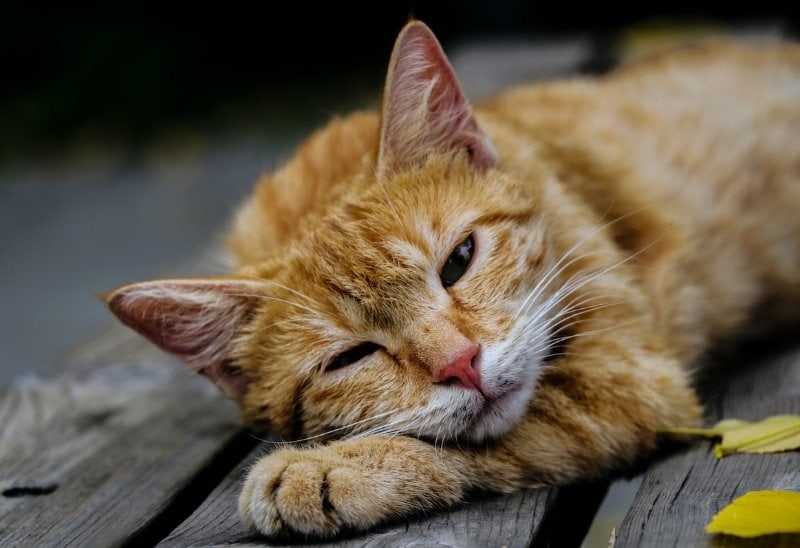
2. Asthma
Many felines suffer from asthma, which causes inflammation of the lungs and narrowing of the airway passages. Feline asthma can occur when your feline inhales allergens like pollen or dust. To recognize asthma in your feline, besides chronic coughing, you’ll likely notice the following signs:
Any feline can develop asthma, so if your cat has this condition, it’s your responsibility to prevent your cat from inhaling any triggering allergens. It’s also a good idea to reduce stress, as it can affect the clinical signs of your cat’s asthma.
Treatment Options:
Unfortunately, there is no permanent cure for feline asthma; however, you can lower the chances of asthma reactions by reducing the exposure of your feline to allergens and making routine changes like:
If you suspect that your cat has feline asthma, contact your vet, as they will perform the necessary testing and prescribe a treatment for your furry friend.
3. Pleural Effusion
Pleural effusion is the term used to describe an abnormal level of fluid inside a cat’s chest. This condition in cats decreases the space for the lungs to properly expand inside the chest cavity, leading to various health issues, mostly breathing related.
Feline pleural effusion can cause coughing in your cat, followed by several other signs:
Pleural effusion could also indicate other underlying health issues in your cat, such as cancer, diaphragmatic hernia, and heart failure. Therefore, if you notice coughing along with any of these signs, contact your veterinarian.
Treatment Options:
Most of the time, the treatment for cats suffering from pleural effusion involves spending a certain amount of time in oxygen cages to regulate their breathing. The cat may also need to undergo thoracentesis, which is used to remove excess fluids from the lungs.
The long-term treatment for this problem in cats may vary based on the cause of pleural effusion. Once your vet discovers this, your feline will be able to receive further treatment.
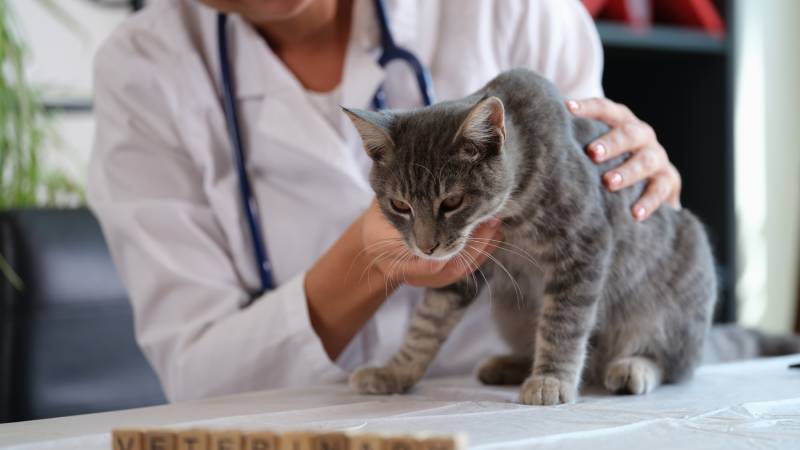
4. Lung Cancer (Adenocarcinoma)
Cats are susceptible to various types of cancer, though only one type of feline cancer causes coughing: adenocarcinoma, also known as lung cancer, which affects your cat’s respiratory tract.
Adenocarcinoma makes up around 75% of all cat lung tumors. Besides coughing, adenocarcinoma causes other clinical signs in your feline, such as:
Adenocarcinoma is a severe health problem that requires immediate veterinary attention in order to get the best possible outcome for your cat.
Treatment Options:
If your feline suffers from adenocarcinoma, your vet will likely refer you to a vet oncologist for your cat’s check-up. There are three main ways to treat cancer in cats:
However, there’s no single treatment that works for all patients; the vet and oncologist will come up with a detailed plan that will be the most effective for your feline.
5. Trauma
Felines that have experienced any kind of chemical, physical, or thermal injury of the respiratory tract may experience coughing as a sign of the injury. If your feline is suffering from potential trauma, it’s best to monitor your cat for a few days and speak with your veterinarian if needed.
Most cats with respiratory tract trauma will also display signs of discomfort, pain, and lethargy. Depending on the severity of the trauma, some felines may require urgent medical attention.
Treatment Options:
The treatment for trauma in cats can vary based on the injury’s severity. In most cases, the vet will perform a medical exam and prescribe the needed treatment, which may include surgery.
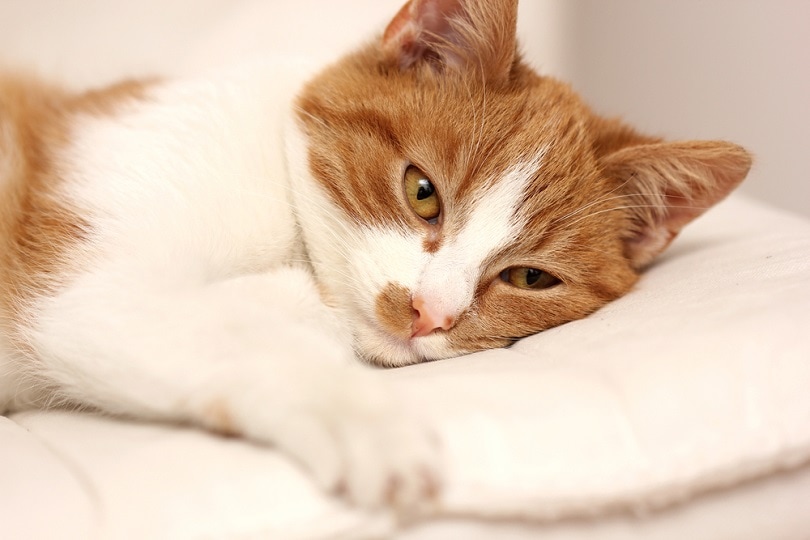
6. Inhaled Foreign Objects
Cats are naturally curious creatures, which is why they like to sniff and explore all kinds of things and environments. Therefore, it’s possible for cats to inhale foreign objects like pieces of grass, rubber, paper, plant material, small toys, or food. This is a commonly deadly condition in veterinary practice. Foreign body obstruction may result in coughing in your cat, and it could cause other signs, including:
The prognosis for your feline will be determined by several factors, such as the inhalation time, location of the foreign body, its shape, size, and characteristics, and your cat’s current health.
Treatment Options:
Inhalation of foreign objects can lead to serious issues in your feline, so you should react promptly after the incident occurs and take your cat to the vet. The veterinarian will provide a diagnosis and plan a prognosis based on your cat’s state and other factors. Typically, the treatment includes removing the foreign object in combination with antibiotics to prevent infections.
Remember that time is of the essence in these situations, so react promptly to ensure that your cat gets the needed medical treatment quickly.
7. Heartworms
Your cat may be coughing due to heartworms. Heartworm disease is caused by worms that inhabit the heart, lungs, and blood vessels of your cat. The clinical signs vary based on the severity of the disease, though the most common signs besides coughing are typically:
Since heartworms are parasites that can lead to multiple health issues and even death in your cat, it’s essential to react promptly and seek treatment for your furry companion.
Treatment Options:
Treating heartworms in felines is challenging, as many common therapies are toxic to cats, which makes them unsuitable to use. That said, some veterinarians may prescribe steroids or antibiotics, while others may try to surgically remove the heartworms.
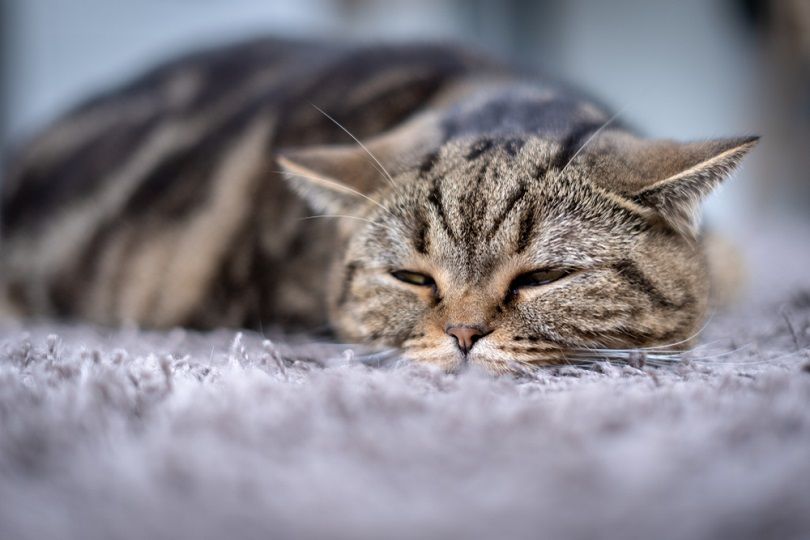
When Does Your Cat’s Cough Require Medical Attention?
It is entirely normal for cats to cough every once in a while, so as long as the cough is not productive and your feline is maintaining good health. There’s no reason to panic. Of course, if you feel like there’s something wrong with your cat, seek medical advice from your veterinarian.
Irregular coughs in your cat don’t require urgent medical attention, but if your cat is coughing frequently, followed by other signs, it’s better to be safe than sorry and discuss the problem with your vet, who will let you know if there’s a need for treatment.
Conclusion
Cats can cough for various reasons; some are harmless, while others are more severe. It’s uncommon for cats to cough frequently, so be sure to inspect your cat’s health to ensure that there are no underlying medical issues.
Featured Image Credit: stokerolga, Shutterstock







